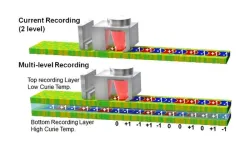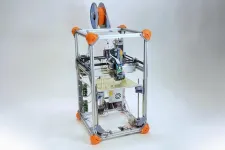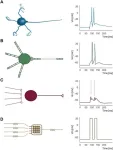In addition to City of Hope’s robust data being presented throughout the meeting, John D. Carpten, Ph.D., the Irell & Manella Cancer Center Director’s Distinguished Chair and the Morgan & Helen Chu Director’s Chair of the Beckman Research Institute, will chair and serve as a featured speaker for the presentation “Molecular Profiling in Breast Cancer and Racial/Ethnic Minorities: Dedicated to the Memory of Edith P. Mitchell” on Monday, April 8, 2024, at 10:15 a.m.
On Tuesday, April 9, 2024, from 10:15 to 11:45 a.m., Marcel van den Brink, M.D., Ph.D., president of City of Hope Los Angeles and City of Hope National Medical Center, and Deana and Steve Campbell Chief Physician Executive Distinguished Chair, will lead a major symposium as chair of The Microbiome and Treatment Response to Cancer Therapy. He will also present on “The role of the intestinal microbiome in cancer immunotherapy,” discussing clinical and preclinical studies that demonstrate how changes in the gut microbiome can affect outcomes after hematopoietic cell transplantation and CAR T cell therapy.
“City of Hope’s research presented at AACR’s conference this year reinforces our focus on early detection, smarter and more precise treatments, and achieving health equity. Through our national system, City of Hope continues to expand the reach and impact of our transformative, first-in-class science and clinical care to support more people living with cancer, regardless of where they are," Carpten said.
“Cancer is complex and the breadth and diversity of research this year further underscores the talent, scientific rigor and curiosity at City of Hope,” Van den Brink added. “City of Hope is a cancer research powerhouse, and we are proud to share our expertise and present leading-edge research on a wide range of cancer topics at AACR.”
Highlights of City of Hope research presented at the AACR conference include:
City of Hope scientists develop a test to better detect early-stage pancreatic cancer
Pancreatic cancer diagnosed once it has spread beyond the pancreas is highly untreatable — the five-year relative survival rate is only 3.2% for those patients, according to the National Cancer Institute. But those diagnosed when the cancer is contained to the pancreas have a 44.3% relative survival rate after five years.
“Developing a test that can better detect Stage 1-2 pancreatic cancers is crucial in improving survival rates for this devastating disease,” said Ajay Goel, Ph.D., M.S., AGAF, City of Hope professor and chair of the Department of Molecular Diagnostics and Experimental Therapeutics.
A City of Hope team led by Goel, and Caiming Xu, Ph.D., a postdoctoral fellow in Goel’s lab, developed an exome-based liquid biopsy test that detected 97% of early-stage pancreatic ductal adenocarcinoma when combined with the biomarker CA 19-9 in people enrolled in the study from the United States, South Korea, Japan and China. Study results were presented today at an AACR press conference.
Five hundred twenty-three people with pancreatic cancer and 461 healthy donors participated in the study, including: United States (139 with pancreatic cancer, 193 healthy donors), South Korea (184 with pancreatic cancer, 86 healthy donors), Japan (150 with pancreatic cancer; 102 healthy donors) and China (50 with pancreatic cancer; 80 healthy donors).
Current biomarkers used in the clinic, such as the CA19-9 blood test, lack sufficient sensitivity for the early detection of pancreatic cancer. Other challenges include the location of the pancreas deep in the abdomen.
To overcome these challenges, the City of Hope team elevated the specificity and sensitivity of their novel liquid biopsy approach by testing plasma for exosomal cargo, which is shed by tumors and replicates the biology of their tissue of origin. The team also identified and tested eight microRNAs, which are small molecules that are found on exosomes shed by pancreatic cancers. They then combined these microRNAs with five cell-free DNA markers found in the blood of patients with pancreatic cancer to develop a signature to detect this disease.
The liquid biopsy signature was first tested in the Japanese cohort and then validated in the cohorts from the United States, South Korea and China. Study results demonstrate that the liquid biopsy approach detected: 93% of pancreatic cancers in the United States cohort, 91% of pancreatic cancers in the South Korean cohort and 88% of pancreatic cancers in the Chinese cohort.
Furthermore, when researchers combined their signature with the pancreatic cancer marker CA19-9, the liquid biopsy test accurately detected 97% of Stage 1-2 pancreatic cancers in the United States cohort.
“The results are exciting because pancreatic cancer diagnosed after it has spread significantly is devastating with a low survival rate. But if we catch it early, there is a better chance we can remove it surgically and further treat it,” said Goel, the study’s senior author.
“Our exosome-based diagnostic did catch more pancreatic cancers early, inspiring hope for more early detection and treatment of pancreatic cancer,” said Xu, the study’s first author.
Based on the team’s trial results, Xu said it could be offered to specific groups that have a higher risk of developing pancreatic cancers, such as people with new-onset diabetes, benign cysts, chronic pancreatitis or a mild family history of pancreatic cancer.
The presentation titled “An exosome-based liquid biopsy for non-invasive, early detection of patients with pancreatic ductal adenocarcinoma: A multicenter and prospective study” will also be presented today from 4:05 to 4:20 p.m. during a session on early detection and progression biomarkers.
The National Cancer Institute of the National Institutes of Health supported this study. Scientists with Translational Genomics Research Institute, part of City of Hope, also contributed to the study.
Pharus Diagnostics also holds a global exclusive license agreement with City of Hope for proprietary biomarkers that are used in this test.
Treating advance cancers with an oncolytic virus
Daneng Li, M.D., a City of Hope associate professor in the Department of Medical Oncology & Therapeutics Research, will share results from the first-in-human Phase 1 clinical trial of “Oncolytic virus CF33-hNIS for the treatment of advanced cancer” in a poster session on Tuesday, April 9, 2024, 9 a.m. to 12:30 p.m.
Prior to the clinical trial, the City of Hope-developed oncolytic virus CF33-hNIS had been shown to shrink colon, lung, breast, ovarian and pancreatic cancer tumors in preclinical laboratory and animal models. Oncolytic virus therapy uses viruses found in nature that are genetically modified to infect, replicate and kill cancer cells, while sparing healthy cells.
In collaboration with Imugene Limited, a clinical stage immuno-oncology company to whom the engineered virus was licensed, researchers administered CF33-hNIS intratumorally or intravenously in adult patients with metastatic or advanced solid tumors in a dose escalation Phase 1 trial.
Preliminary data from this trial demonstrates encouraging anti-tumor activity with CF33-hNIS treatment, Li said. Notably, one patient with cholangiocarcinoma, or biliary tract cancer, achieved an immune complete response, meaning the disappearance of all signs of cancer after treatment with CF33-hNIS with no known recurrence after one year.
Moreover, patients who responded to CF33-hNIS treatment showed a robust innate and adaptive immune response that promotes anti-tumor immunity. Additional analysis of the T cell repertoire reveals that T cell diversity may serve as a predictive biomarker.
“The results show that our novel oncolytic virus — both alone or in combination with immunotherapy — has the ability to control various cancer types previously resistant to other treatment options,” Li said, noting that the treatment was also found to be safe with minimal side effects at the doses tested. “These early results provide patients with hope of a new treatment option for cancers refractory to standard treatment.”
Li said the encouraging early efficacy has prompted development to the next part of the study with expansion into various tumor types, including traditionally resistant tumors such as biliary tract cancer and others.
Artificial intelligence can predict colorectal cancer survival rates
Stephen Gruber, M.D., Ph.D., M.P.H., vice president, City of Hope National Medical Center, Eva and Ming Hsieh Family Director’s Chair of the Center for Precision Medicine and medical oncologist, will report on findings from an international team of researchers’ work investigating how “Artificial intelligence measures of tumor infiltrating lymphocytes predict colorectal cancer-specific and overall survival” in a poster session on Wednesday, April 10, 2024, from 9 a.m. to 12:30 p.m.
The team developed and tested a new artificial intelligence (AI)-driven deep learning model, called HopeSTIL©, that provides a highly efficient algorithm for analyzing digital pathology images of colorectal cancer. The algorithm can quickly and accurately quantify tumor infiltrating lymphocytes (TILs), which can be used as biomarkers of treatment response and long-term prognosis in patients.
Identifying TILs typically requires a pathologist to manually count and score immune cells under a microscope. This process is difficult and tedious, and therefore rarely happens.
“HopeSTIL can recognize, identify and count immune cells accurately and efficiently without a microscope or pathologist,” said Gruber, who noted that the technology can also predict five-year survival and overall survival rates. “AI-predicted immune cells within the tumor are associated with improved five-year colorectal cancer specific survival.”
Gruber and the team used a large dataset of 1,738 colorectal cancer cases to assess the model’s positive prediction rate and tested it in a second independent dataset of 223 cases to validate its success.
“It doesn't matter if you adjust for all of the other features that can impact survival like age, sex, race, ethnicity, stage or other molecular features, it's still strongly predictive of cancer specific survival,” said Gruber. “We look forward to leveraging this technology in the clinic so it can help us more accurately diagnose and treat colorectal cancer.”
Additional research highlights from City of Hope participants at AACR:
Enrique Velazquez Villarreal, M.D., Ph.D., M.P.H., M.S., City of Hope assistant professor, Department of Integrative Translational Sciences, will present “Multi-omics characterization of molecular features and global-local genomic ancestry analysis of colorectal cancer in Hispanic-Latinos” during a minisymposium session on Monday, April 8, 2024, from 3:35 to 3:50 p.m. John Murad, Ph.D., a staff scientist in the laboratory of Saul J. Priceman, Ph.D., City of Hope associate professor, Department of Hematology & Hematopoietic Cell Transplantation, will present a poster session titled “Microbiome modification impacts PSCA directed chimeric antigen receptor (CAR) T cell therapy for prostate cancer” on Wednesday, April 10, 2024, from 9 a.m. to 12:30 p.m.
# # #
About City of Hope
City of Hope's mission is to make hope a reality for all touched by cancer and diabetes. Founded in 1913, City of Hope has grown into one of the largest cancer research and treatment organizations in the U.S. and one of the leading research centers for diabetes and other life-threatening illnesses. City of Hope research has been the basis for numerous breakthrough cancer medicines, as well as human synthetic insulin and monoclonal antibodies. With an independent, National Cancer Institute-designated comprehensive cancer center at its core, City of Hope brings a uniquely integrated model to patients spanning cancer care, research and development, academics and training, and innovation initiatives. City of Hope’s growing national system includes its Los Angeles campus, a network of clinical care locations across Southern California, a new cancer center in Orange County, California, and cancer treatment centers and outpatient facilities in the Atlanta, Chicago and Phoenix areas. City of Hope’s affiliated group of organizations includes Translational Genomics Research Institute and AccessHopeTM. For more information about City of Hope, follow us on Facebook, X, YouTube, Instagram and LinkedIn.
END


